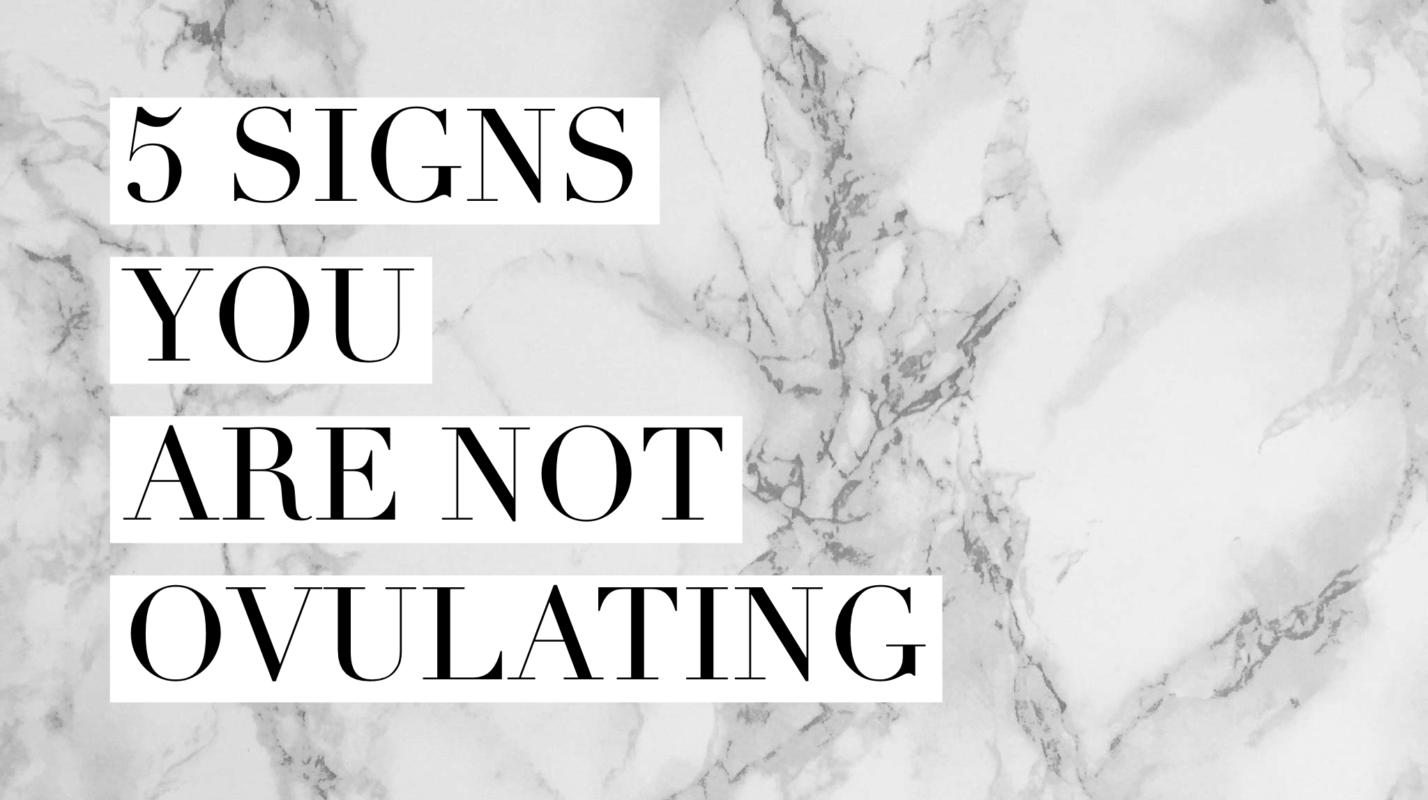
Regular ovulation is a vital sign for women's health.
Ovulation occurs when you release an egg from your ovaries. It is what allows you to conceive and get pregnant, or if pregnancy does not occur you then have your period.
However, for many women it is not always that simple to know if they are ovulating or not. Did you know you can get a period even if you do not ovulate?
Now, I wouldn't really call this a "period" but more just a "bleed." You can still bleed even if you do not ovulate, however ovulation is what makes a period a true period. For example, if you are on birth control that suppresses ovulation you still may "bleed" but this is very different than a period that occurs after ovulation in a normal, healthy cycle.
Whether you are trying to conceive or you are just wanting to make sure you are healthy, knowing if and when you ovulate is key.
5 signs you are not Ovulating:

1) Your cycles are very long
A "normal," healthy cycle for a grown woman will last between 21-35 days with most women falling around 28 days. If you have cycles that are over 35 days however you may have not ovulated at all. This would be called an "anovulatory cycle."
You may however just have had a long follicular phase, or time before ovulation. This is something I have personally experienced in my life. After ovulation, unless you get pregnant, you will only have a luteal phase as long as 16 days and then you will get your period.
2) Your cycles are too short
A short cycle is classified as less than 21 days in length. If you have a cycle less then this then it is a very clear sign that you likely did not ovulate and your body did not produce the necessary hormones.
Having shorter cycles, even under 23 days, may also be less then optimal because it can be a sign of a short luteal phase. If you are trying to get pregnant, having cycles closer to 23 days would be optimal.
3) Bleeding a long time
A normal, healthy period lasts 2-7 days and you will lose about 80 ml of blood total. Typically the first 2 days are heavier and then the bleeding starts to taper down. When you bleed very heavy for a long time, or even light bleeding but for an extended number of days this can be a sign that you did not ovulate.
4) You did not experience any changes in cervical mucus
During your cycle, you go through phases of cervical mucus production. Closer to the time of ovulation you will notice that you feel more wet "down there." You will also see a change in the color and consistency of mucus produced, from watery to more of a thicker consistency, more like a light hand lotion possible for a day or two then towards an egg white consistency. This indicates that ovulation is occurring.
If you constantly feel "dry" down there then you may not be experiencing ovulation.
5) Your Basal Body Temperature did not change
Paired with observing cervical mucus changes you can test your basal body temperature to see if you are ovulating.
If you take your body temperature every morning, around the same time before you get out of bed, you will notice that your temperature stays around the same tenth of degree in temperature. Right before ovulation, you will notice a slight dip and then spike in temperature. This will be so slight, which is why you need a basal thermometer.
If you never get that spike in temperature then you may not have ovulated.
Regular ovulation is not only important if you want to conceive, but is something all women should pay attention to as it is a great indicator of overall health.
Our hormones can be quite sensitive to our surroundings and the impact on our bodies. If you suspect you are not ovulating there are many factors that could be playing a role:
- Stress- good stress, such as getting married, starting a new job, or bad stress such as too much pressure at work, or problems in relationships can all influence your hormones and your ability to ovulate
- Excessive exercise- what is excessive? Well that is quite individual. For me personally, I need some exercise to maintain healthy hormonal levels, but I am a bit more "delicate" then others can be easily influenced by too strenuous or too much physical activity. For other ladies, they may be able to handle a bit more. If you suspect you are not ovulating, consider if you need to adjust your exercise one way or the other.
- Poor nutrition- having a healthy diet that provides your body with optimal nutrients and balances your blood sugar is key to proper hormonal production.
- Imbalanced blood sugar- this is one of the main reasons women with PCOS may not experience ovulation. Luckily, with changes in your diet you can likely overcome this.
- Thyroid dysfunction- hyper and hypo thyroidism can both influence ovulation. As can "sub-clinical" thyroid issues, which means your doctor may say your test looks "normal" but really your thyroid needs a bit more care.
- Breastfeeding - your body may naturally suppress ovulation while you are breastfeeding. For some women they need to completely stop breastfeeding to regain regular ovulation.
- perimenopause
- Not being at a healthy weight, this can be under weight or over weight
And many, many other factors that can influence hormonal production, balance and ovulation.
My first tip is to start to pay attention to the signs your body is giving you, observe your cervical mucus and start tracking your basal body temperature to see if you are ovulating.
Would you like more guidance? Schedule your Free Natural Fertility Breakthrough Session with me now